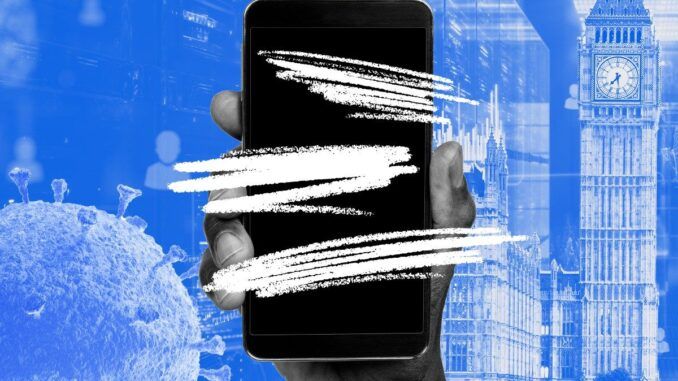
Critics of Covid restrictions were targeted by a secret counter-disinformation team at the heart of the British Government.
The government unit (CDU) worked with social media companies to curtail discussions about the controversial lockdown restrictions according to an investigation by the Telegraph.
It was set up by ministers to to tackle supposed domestic “threats” deal and with individuals or groups who criticised policies like the mass vaccination of children or lockdowns during the pandemic.

BYPASS THE CENSORS
Sign up to get unfiltered news delivered straight to your inbox.
You can unsubscribe any time. By subscribing you agree to our Terms of Use
The Telegrpah reports: Critics of lockdown had posts removed from social media. There is growing suspicion that social media firms used technology to stop the posts being promoted, circulated or widely shared after being flagged by the CDU or its counterpart in the Cabinet Office.
Documents revealed under Freedom of Information (FoI) and data protection requests showed that the activities of prominent critics of the Government’s Covid policies were secretly monitored.
An artificial intelligence firm (AI) was used by the Government to scour social media sites. The company flagged discussions opposing vaccine passports.
Many of the issues being raised were valid at the time and have since been proven to be well-founded.
The BBC also took part in secretive meetings of a government policy forum to address the so-called disinformation.
On Friday, MPs and freedom of speech campaigners condemned the disclosures as “truly chilling” and “a tool for censoring British citizens” akin to those of the Chinese Communist Party.
Much of the Government’s wider work on disinformation is shrouded in secrecy for “national security” reasons. Large parts of official documents are still redacted.
In America, Twitter has released similar information showing how the US government also introduced a secretive programme to curtail discussion of Covid lockdowns.
It can now be revealed that the activities of Prof Carl Heneghan, the Oxford epidemiologist who has advised Boris Johnson, and Dr Alexandre de Figueiredo, a research fellow at the London School of Hygiene and Tropical Medicine (LSHTM), were monitored by government disinformation units.
Molly Kingsley, who set up a campaign to keep schools open during the pandemic, also had her social activity monitored.
As well as the CDU, the Government operated a Rapid Response Unit (RRU) in the Cabinet Office that hunted online for content it considered disinformation.
The CDU, which is still operating, was embedded in the Department for Culture, Media and Sport (DCMS).
The department has “trusted flagger” status at social media companies including Facebook and Twitter, which means that requests for content to be removed are fast-tracked for consideration.
In some cases, individuals whose social media posts were recorded by the units have subsequently faced sanctions by Twitter and Facebook. Ministers denied asking for posts by Prof Heneghan, Dr. de Figueiredo or Ms Kingsley to be removed.
The Government has said that the CDU “is focused on helping the Government understand online disinformation narratives and understand attempts to artificially manipulate the information environment”.
The Government also ran a Counter-Disinformation Policy Forum, which brought together civil servants from the DCMS and technology giants – including Facebook and Google – as well as the BBC to discuss how to limit the spread of what was considered COVID-19 disinformation.
This forum and the two units were not the only way the Government tried to apply pressure on social media companies during the pandemic.


